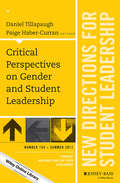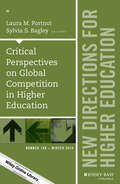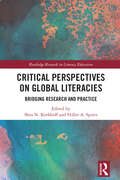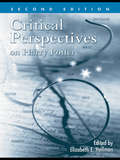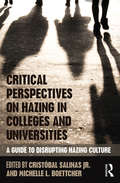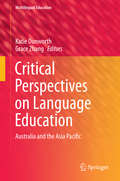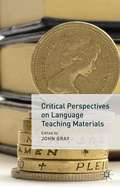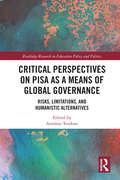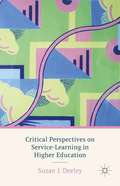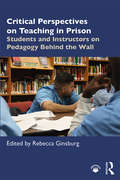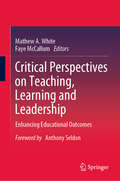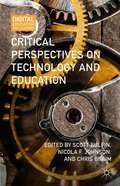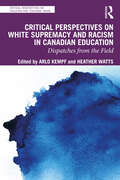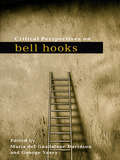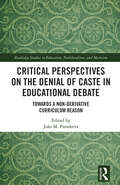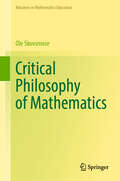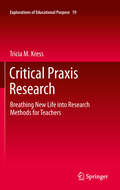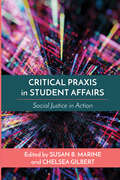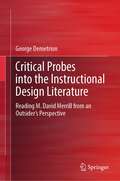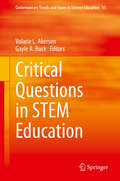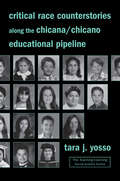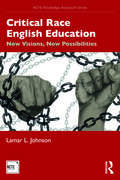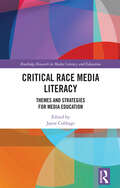- Table View
- List View
Critical Perspectives on Gender and Student Leadership: New Directions for Student Leadership, Number 154 (J-B SL Single Issue Student Leadership)
by Paige Haber-Curran Daniel TillapaughHow do students’ social identities, particularly their gender, influence their leadership practices and development? Using Kimberlé Crenshaw’s concept of intersectionality as a framework, this volume discusses existing and emergent research on gender and leadership and offers key strategies and on how leadership educators can engage students in these topics and provide contemporary critical thinking on how gender and leadership inform one another.This volume examines: the ways intersectionality can be used as a lens for gender and leadership, key considerations for developing and advancing leadership among women, men, and trans* students, programs and experiences grounded in critical self-reflection and leadership learning among students of all genders, and opportunities for leadership educators to navigate topics of gender and leadership, emphasizing their own self-work and avenues for affecting positive change. Contributing scholars share examples that are developmentally appropriate for high school and college students. This work is designed with leadership educators in mind, emphasizing theory into practice and highlighting the ways that leadership and gender can promote holistic, transformative learning for all students.The Jossey-Bass quarterly report series New Directions for Student Leadership explores leadership concepts and pedagogical topics of interest to high school and college leadership educators. Issues are grounded in scholarship and feature practical applications and best practices in youth and adult leadership education.
Critical Perspectives on Global Competition in Higher Education: New Directions for Higher Education, Number 168 (J-B HE Single Issue Higher Education)
by Laura M. Portnoi Sylvia S. BagleyThis volume delivers a cutting-edge analysis on vernacular globalization, or how local forces mediate global trends. It delves into the vital facets of the quest for global competitiveness, including: Global university rankings World-class universities University mergers Quality assurance Cross-border higher education International education hubs. The authors situate their topics within current international scholarship and demonstrate the myriad avenues through which local actors in higher education may respond to global competition. They pose critical questions about the impact of global competition in an increasingly hierarchical higher education environment, interrogating the potential for social injustice that arises. By providing an alternative perspective to the descriptive, normative approach that dominates the scholarship on global competition in higher education, the chapters in this volume open a fresh and invaluable dialogue in this arena.This is the 168th volume of the Jossey-Bass quarterly report series New Directions for Higher Education. Addressed to presidents, vice presidents, deans, and other higher education decision makers on all kinds of campuses, it provides timely information and authoritative advice about major issues and administrative problems confronting every institution.
Critical Perspectives on Global Literacies: Bridging Research and Practice (Routledge Research in Literacy Education)
by Shea N. Kerkhoff Hiller A. SpiresThis book offers critical perspectives on global literacies, connecting research, theory, and practice. An emerging concept in the literacy field, many scholars agree on the need for students to develop global literacies, yet few agree on a widely accepted definition. Based on a synthesis of the literature, the editors formulate a definition of global literacies with four dimensions, including: literacy as a human right in all nations around the world; critical reading and creation of multimodal texts about global issues; intercultural communication and reciprocal collaboration with globally diverse others; and transformative action for social and environmental justice that traverses borders. Taking this shared, proposed definition as a starting point, the chapters then offer contextualized examples of global literacies from K-12 and teacher education classrooms to make explicit links between research and practice. The contributors interact with and interrogate the book’s definition of global literacies using a common framework of critical theory. As such, this book provides both emerging and established scholars with critical frameworks for positioning global literacies in ways that are relevant, dynamic, and forward thinking.
Critical Perspectives on Harry Potter
by Elizabeth E. HeilmanThis thoroughly revised edition includes updated essays on cultural themes and literary analysis, and its new essays analyze the full scope of the seven-book series as both pop cultural phenomenon and as a set of literary texts. Critical Perspectives on Harry Potter, Second Edition draws on a wider range of intellectual traditions to explore the texts, including moral-theological analysis, psychoanalytic perspectives, and philosophy of technology. The Harry Potter novels engage the social, cultural, and psychological preoccupations of our times, and Critical Perspectives on Harry Potter, Second Edition examines these worlds of consciousness and culture, ultimately revealing how modern anxieties and fixations are reflected in these powerful texts. ("DISCLAIMER: This book is not authorized, approved, licensed, or endorsed by J.K. Rowling, Warner Bros. Entertainment Inc., or anyone associated with the Harry Potter books or movies.")
Critical Perspectives on Hazing in Colleges and Universities: A Guide to Disrupting Hazing Culture
by Cristóbal Salinas Jr. Michelle L. BoettcherThis important resource explores the political, cultural, and historical context of hazing at colleges and universities, and also highlights the diverse settings where hazing occurs on campus. Grounded in empirical practice and research, chapter authors discuss current hazing policies and implications to student success while challenging dangerous and harmful hazing habits. Unpacking common myths, this volume helps higher education and student affairs practitioners understand the implications of policy while providing best practices and practical tools for fostering safe and productive organizations on campus. Critical Perspectives on Hazing in Colleges and Universities helps readers continue to educate themselves in prevention while advocating for the lives of people affected by or vulnerable to hazing.
Critical Perspectives on Language Education: Australia and the Asia Pacific (Multilingual Education #11)
by Katie Dunworth Grace ZhangThe studies in this volume investigate how multilingual education involves a critical engagement with questions of identity and culture, and a movement towards new ways of being and belonging. It addresses previously under-explored issues, in particular the integration of theories like 'thirdness', and practices of language education and maintenance with relevance to the Asia-Pacific region. The analyses reveal the delicate balance of interests of all stakeholders and offer detailed insights into the reality of multilingual education, with specific examples of Chinese, English, Japanese and Tamil. In a globalised world, effective language education has become increasingly important, and the studies presented here have the potential to inform and advance evidence-based multilingual education through adding important dimensions of theoretical exploration and refreshing empirical resources.
Critical Perspectives on Language Teaching Materials
by John GrayThis Critical Perspectives on Language Teaching Materials brings together a collection of critical voices on the subject of language teaching materials for use in English, French, Spanish, German and Content and Language Integrated Learning (CLIL) classrooms.
Critical Perspectives on PISA as a Means of Global Governance: Risks, Limitations, and Humanistic Alternatives (Routledge Research in Education Policy and Politics)
by António TeodoroThis volume offers a critical examination of the Programme for International Students Assessment (PISA), focusing on its origins and implementation, relationship to other international large-scale assessments, and its impacts on educational policy and reform at national and cross-national levels. Using empirical data gathered from a research project carried out by the CeiED at Lusophone University, Lisbon, the text highlights connections between PISA and emergent issues including the international circulation of big science, expertise, and policy, and identifies its conceptual and methodological limits as a global governance project. The volume ultimately provides a novel framework for understanding how OECD priorities are manifested through a regulatory instrument based in Human and Knowledge Capital Theory, and so makes a powerful case to search for new humanistic approaches. This text will benefit researchers, academics, and educators with an interest in education policy and politics, international and comparative education, and the sociology of education more broadly. Those interested in the history of education will also benefit from this volume.
Critical Perspectives on Service-Learning in Higher Education
by Susan J. DeeleyThrough innovative analysis of theory and practice, this book offers refreshing critical perspectives on service-learning in higher education. It constructs a theoretical paradigm for service-learning which extends to critical pedagogy, and investigates critical reflection and academic reflective writing, supported throughout by empirical evidence.
Critical Perspectives on Teaching in Prison: Students and Instructors on Pedagogy Behind the Wall
by Rebecca GinsburgThis volume makes a case for engaging critical approaches for teaching adults in prison higher education (or “college-in-prison”) programs. This book not only contextualizes pedagogy within the specialized and growing niche of prison instruction, but also addresses prison abolition, reentry, and educational equity. Chapters are written by prison instructors, currently incarcerated students, and formerly incarcerated students, providing a variety of perspectives on the many roadblocks and ambitions of teaching and learning in carceral settings. All unapologetic advocates of increasing access to higher education for people in prison, contributors discuss the high stakes of teaching incarcerated individuals and address the dynamics, conditions, and challenges of doing such work. The type of instruction that contributors advocate is transferable beyond prisons to traditional campus settings. Hence, the lessons of this volume will not only support readers in becoming more thoughtful prison educators and program administrators, but also in becoming better teachers who can employ critical, democratic pedagogy in a range of contexts.
Critical Perspectives on Teaching, Learning and Leadership: Enhancing Educational Outcomes
by Mathew A. White Faye McCallumThis book addresses the significant problems that can arise for pre-service teachers, teachers and school leaders who are unprepared for the complexities of 21st century teaching. It focuses on major factors impacting teacher preparation during an era of significant change, including student learning, academic growth, classroom practice, and the efficacy of teachers. In turn, the book considers crucial aspects that can enhance educational outcomes and investigates questions including what impact the changing nature of teachers’ work has on teacher preparation; how educators can evaluate blended learning; and what impact teachers have on learners. This book provides evidence-based approaches that can be used to achieve a positive impact on education and narrow the gap in contemporary and emerging global topics in education.
Critical Perspectives on Technology and Education
by Chris Bigum Scott Bulfin Nicola F. JohnsonThis book offers critical readings of issues in education and technology and demonstrates how researchers can use critical perspectives from sociology, digital media, cultural studies, and other fields to broaden the "ed-tech" research imagination, open up new topics, ask new questions, develop theory, and articulate an agenda for informed action.
Critical Perspectives on White Supremacy and Racism in Canadian Education: Dispatches from the Field (Critical Perspectives on Teaching and Teachers’ Work)
by Arlo Kempf Heather WattsCritical Perspectives on White Supremacy and Racism in Canadian Education shows how K-12 schooling continues to produce and maintain white supremacist and colonial logics and questions the alternate future of schooling in Canada.It argues that white supremacy and race in schooling are present in colonial-centered approaches to teacher education, formal and informal exclusion through curriculum development, and persistent failed commitments to racial justice and decolonization. These themes guide the organization of this collection, which is further underpinned by theoretical perspectives, including critical race theory, anti-Blackness theory, abolition, and anticolonial theory. Contributions are drawn from classroom teachers, community educators, and pre-service teacher educators and are powerfully informed by first-hand accounts as well as stories of teachers and teacher candidates.Combining theory with practice, this edited volume will be important reading for advanced undergraduate and postgraduate students in social justice education, multicultural education, and Indigenous studies. It will also be beneficial reading for antiracist and Indigenous education researchers, as well as policymakers and practitioners within critical education.
Critical Perspectives on bell hooks (Critical Social Thought)
by George Yancy Maria del Guadalupe DavidsonAlthough bell hooks has long challenged the dominant paradigms of race, class, and gender, there has never been a comprehensive book critically reflecting upon this seminal scholar’s body of work. Her written works aim to transgress and disrupt those codes that exclude others as intellectually mediocre, and hooks’ challenge to various hegemonic practices has heavily influenced scholars in numerous areas of inquiry. This important resource thematically examines hooks’ works across various disciplinary divides, including her critique on educational theory and practice, theorization of racial construction, dynamics of gender, and spirituality and love as correctives in postmodern life. Ultimately, this book offers a fresh perspective for scholars and students wanting to engage in the prominent work of bell hooks, and makes available to its readers the full significance of her work. Compelling and unprecedented, Critical Perspectives on bell hooks is a must-read for scholars, professors, and students interested in issues of race, class, and gender.
Critical Perspectives on the Denial of Caste in Educational Debate: Towards a Non-derivative Curriculum Reason (Routledge Studies in Education, Neoliberalism, and Marxism)
by João M. ParaskevaThis volume represents the first exploration of caste in the field of curriculum studies, challenging the ongoing silence around the issue of caste in education and curriculum theory. Presenting comprehensive critical examination of caste as a category of domination and oppression in the colonial power matrix, chapters confront Eurocentric educational epistemologies which deny the existence and influence of caste. The book examines the impact of such silence in educational policy, praxis, and curriculum, and draws from leading scholars to illustrate the fluidity of power and oppression in the caste system. By challenging historical, cultural, and institutional origins of caste and foregrounding perspectives from outside Western epistemological frameworks, the book pioneers a critical approach to integrating caste in educational debate to interrupt social and cognitive injustices. In so doing so, the volume advocates for an alternative, non-derivative curriculum reason, through an itinerant curriculum theory as a path toward the emergence of a critical Dalit educational theory. As such, it makes a vital contribution for scholars and researchers looking to refine and enhance their knowledge of curriculum studies by highlighting the importance of theorizing caste in the role of education.
Critical Philosophy of Mathematics (Advances in Mathematics Education #15)
by Ole SkovsmoseThis book provides a philosophy of mathematics that resonates with critical mathematics education. It draws attention to the social complexities that characterise the period of Modernity including the extreme exploitation of manual workers and their families, brutal forms of colonisations, trading of slaves, and the formation of racist ideologies. It portrays Modernity as a period of contradictions and highlights that mathematics is a part of these contradictions. The text interprets mathematics as being indefinite, seeing that mathematics is a part of the ongoing human constructions. It outlines a performative interpretation of mathematics, portraying mathematics as intrinsically connected to actions. Any kind of action, including mathematics-based actions, calls for ethical considerations and this leads to any mathematical practice, either in research, application, or education, to face ethical challenges. It illustrates with examples how a critical philosophy of mathematics can come to be an integral part of classroom practices.
Critical Praxis Research: Breathing New Life into Research Methods for Teachers (Explorations of Educational Purpose #19)
by Tricia M. KressCritical Praxis Research (CPR) is a teacher research methodology designed to bridge the divide between practitioner and scholar, drawing together many strands to explain the research process not just as something teacher researchers do, but as a fundamental part of who teacher researchers are. Emphasizing the researcher over the method, CPR embraces and amplifies the skills and passions teachers naturally bring to their research endeavours. Emerging from the tradition of critical pedagogy, Critical Praxis Research: Breathing New Life into Research Methods for Teachers transcends longstanding debates over quantitative vs. qualitative and scholar vs. practitioner research. The text examines the histories and current applications of common methodologies and re-conceptualizes the ways that these methodologies can be used to enhance teachers' identities as practitioners and researchers. It also provides a critical examination of the role of Institutional Review Boards, and explores the complexity and ethics of data collection, data analysis, and writing. Through guiding questions and writing prompts, the author encourages readers to think through the process of design and conducting CPR. The text is theoretically rich, but written in an accessible style infused with metaphor, irony, and humour. Critical Praxis Research: Breathing New Life into Research Methods for Teachers is both instructive and uplifting, sending the message that research is difficult but also joyful, like life itself.
Critical Praxis in Student Affairs: Social Justice in Action
by Susan B. MarineStudent affairs work—like higher education—is fundamentally about change. Principally, the change work performed by student affairs practitioners is about supporting the growth and development of individual students and student groups. Increasingly, that work has called for practitioners to become more active in working to change higher education so that it lives up to its radically democratic, inclusive ideals. This means adopting new strategies to transform student affairs staff, students, and institutions, and drawing on insights from critical, liberatory theories. This text represents an effort to describe and document these practices of intentionally centering critical theories.The first section of this text examines the ways that critically-minded practitioners lead through equitable, liberatory frameworks, offering important models for reimagining the future of higher education. In the second section, the editors take up thinking and acting to support the development of critical consciousness in students, providing examples of programs, initiatives, and student support offices that center social justice in their work, and foster a critical lens through their interactions with students. In their conclusion, the editors provide a model for critical praxis, offering enduring strategies for practitioners seeking to incorporate critical, socially just praxis into their everyday work, and defining areas for future research and praxis, including identifying strategies for effective assessment of critical praxis, and modalities for “scaling up” the work for maximal impact.
Critical Probes into the Instructional Design Literature: Reading M. David Merrill from an Outsider’s Perspective
by George DemetrionThis book provides a comprehensive study of the work of M. David Merrill, a major pioneer in the field of instructional design. This book centers on his research on his second generation instructional design (ID2) theory, Instructional Transaction Theory, and First Principles of Instruction, which has had a substantial impact on the instructional design field. It’s appealing to the instructional design research and practitioner-based communities who can draw on specific sections of this book to enhance their own work. It is also intended for those seeking to learn more about the relationship between the instructional design field, learning theory, curriculum studies, and lifelong learning/adult education studies. Through this critical, yet empathetic study of Merrill’s 50+ year research agenda, this book provides an illuminating field of entry into a broad range of topics, both those that are central to Merrill’s own research agenda, and into areas that extend well beyond his essentially cognitivist epistemological assumptions.
Critical Questions in STEM Education (Contemporary Trends and Issues in Science Education #51)
by Valarie L. Akerson Gayle A. BuckThis edited volume offers a crosscutting view of STEM and is comprised of work by scholars in science, technology, engineering, and mathematics education. It offers a view of STEM from the disciplines that comprise it, while adhering to the idea that STEM itself is an interdisciplinary treatment of all the associated disciplines in a meaningful way. This book raises and answers questions regarding the meaning of STEM education and research.This volume is divided into three sections: the first one describes the nature of the component disciplines of STEM. The next section presents work from leaders representing all STEM disciplines and deals with aspects such as K-12 and post-secondary education. The last section draws conclusions regarding the natures of the disciplines, challenges and advantages of STEM education in terms of theoretical and practical implications. The two final chapters compile arguments from the research chapters, describing themes in research results, and making recommendations for best STEM education practice, and examining areas for future research in STEM education.
Critical Race Counterstories Along the Chicana/Chicano Educational Pipeline
by Tara J. YossoThe book demonstrates the wealth of minority culture and interest in education. The author elaborates how, counter-stories can build and nurture community, challenge perceived wisdoms, reveal silent voices and transform education.
Critical Race Counterstories along the Chicana/Chicano Educational Pipeline (Teaching/Learning Social Justice)
by Tara J. YossoChicanas/os are part of the youngest, largest, and fastest growing racial/ethnic 'minority' population in the United States, yet at every schooling level, they suffer the lowest educational outcomes of any racial/ethnic group. Using a 'counterstorytelling' methodology, Tara Yosso debunks racialized myths that blame the victims for these unequal educational outcomes and redirects our focus toward historical patterns of institutional neglect. She artfully interweaves empirical data and theoretical arguments with engaging narratives that expose and analyse racism as it functions to limit access and opportunity for Chicana/o students. By humanising the need to transform our educational system, Yosso offers an accessible tool for teaching and learning about the problems and possibilities present along the Chicano/a educational pipeline.
Critical Race Counterstories along the Chicana/Chicano Educational Pipeline (Teaching/Learning Social Justice)
by Tara J. YossoChicanas/os are part of the youngest, largest, and fastest growing racial/ethnic 'minority' population in the United States, yet at every schooling level, they suffer the lowest educational outcomes of any racial/ethnic group. Using a 'counterstorytelling' methodology, Tara Yosso debunks racialized myths that blame the victims for these unequal educational outcomes and redirects our focus toward historical patterns of institutional neglect. She artfully interweaves empirical data and theoretical arguments with engaging narratives that expose and analyse racism as it functions to limit access and opportunity for Chicana/o students. By humanising the need to transform our educational system, Yosso offers an accessible tool for teaching and learning about the problems and possibilities present along the Chicano/a educational pipeline.
Critical Race English Education: New Visions, New Possibilities (NCTE-Routledge Research Series #1)
by Lamar L. JohnsonJohnson’s visionary and much-needed book is a call for the transformation of English education to embrace rather than reject Blackness. Confronting the context of heightened racial violence against Black youth that continues to sweep across the United States, Johnson illuminates the interconnection between the physical and symbolic violence that unfolds in and outside the classroom and demonstrates the harm this causes to Black youth. Employing an original framework, Critical Race English Education, Johnson reveals how English education and ELA classrooms are dominated by eurocentric language and literacy practices, and provides a justice-oriented framework that combats anti-Black racism. Throughout the book, Johnson disperses love letters to Blackness, Black culture, and Black people, which serve as actions and practices for positive thinking and self-awareness about Blackness. Critical Race English Education is a movement for Black lives. A crucial resource for pre-service ELA teachers, researchers, professors, and graduate students in language and literacy education, and sociology of education, this book offers classroom lessons, thematic units, sample activities, and other pedagogical and curricula practices that reconceptualize ELA pedagogies in humanizing ways and cater to the needs of students who come from racially and linguistically diverse backgrounds.
Critical Race Media Literacy: Themes and Strategies for Media Education (Routledge Research in Media Literacy and Education)
by Jayne CubbageThis volume offers deeper exploration and advancement of critical race media literacy, a concept which fuses the genres of media literacy and critical media literacy with critical race theory to bring a new and salient frame to the discussion of media literacy across all levels of education in today’s globalized, race-based, and media-saturated climate. Bridging the gap in research that has not addressed the ways in which media is a conduit of racial dialogue and ideology, the book brings together a diverse group of scholars that explore their perspectives on critical race media literacy as it is experienced from the interface and consumption of a variety of media texts and social phenomena. Topics addressed include news literacy, children’s literature, Black political movements, media protests, and ethnic rock—Critical Race Media Literacy addresses these topics within existing media literacy contexts to enhance media literacy scholarship and educational pedagogy. This book will provide a timely and important resource not only for scholars and students of media literacy and media education but also for educators working in diverse learning settings.
